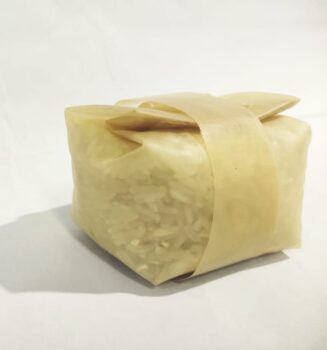
Biopac
Biopac offers seaweed-based pouches, bags, and other packaging solutions for various industries.
PRODUCTS
Images are just visual aids created by EcoHive to give the viewer a general idea of what the vendor can offer. They are based on what can be found in the vendor’s webshop. They do not represent how the products actually look, nor do they showcase the entire product offering of the vendor. For more information, check out the portfolio section or visit the vendor’s website.
SHOWCASE
About Biopac

Materials
- Seaweed
Eco Benefits of the Materials
The eco-benefits of using seaweed:
- Seaweed farming does not need land, pesticide, fertilizer, and irrigation.
- Seaweed farming contributes to maintaining ocean health.
- Seaweed protects the coastline from erosion and provides habitats for animal life.
- During cultivation, seaweed absorbs CO2 for its photosynthesis process, similar to terrestrial plants, but at a faster rate than terrestrial plants do.
- Seaweed grows well in unpolluted seashores, so the farmers actively maintain the cleanliness of the seashore to ensure the seaweed growth.
- Using seaweed as an alternative material to create packaging lessens plastic packaging.
- The cultivation cycle is only 45 days, so it helps the farmers’ cash flow.
- It is labor-intensive, non-capital intensive, more socially inclusive, and empowers women.
Process
- By using seaweed as their material, Biopac helps improve the economy of seaweed farmers and empowers women who live on the coast.

Story
Biopac is a women-led company that was established in 2019 by 2 cofounders whose educational backgrounds and experiences complemented each other.
Noryawati Mulyono, the director, has an undergraduate degree in Chemistry ITB and a doctoral degree in food science IPB, both of which were from the top three ranking schools in Indonesia. She has 20 years of combined working experience in food manufacturing, academia, and entrepreneurship. Her desire to reduce plastic pollution, the root cause of floods in Jakarta every rainy season, drove her to transform a research idea into a commercial product.
In 2010, Noryawati conducted research in bioplastics with the aim to fulfill two main criteria. The first was to use natural, sustainable resources that were abundant in Indonesia and did pose risks of famine and drought. The second criterion was that the product’s end-of-life had to be safe for the environment.
As a result of this research, Biopac was created in 2019. Standing beside Noryawati from the beginning until 2021 was chairman Lie Tham Tjhun, who brought with her years of success and knowledge as the owner of a food manufacturing company. However, due to the pandemic, she decided to retire in 2021 and handed over her position to Indrawati Mulyono, the elder sister of Noryawati Mulyono.
Indrawati added to Biopac’s strong foundation with her experience in industrial engineering, production planning, inventory control, and fund management.
Biopac is very grateful to have driven, experienced leaders who will help the company succeed at a time when societal awareness of environmental problems is increasing.

Vision
“To be the first true biopackaging manufacturer and the leader in the circular packaging story that can extend across packaging variant formats.”

Mission
“To manufacture seaweed-based biopackaging to tackle single-use plastic waste pollution without sacrificing consumers’ convenience. “































